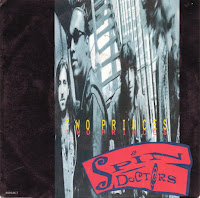— Sylvia Patterson
This is the second consecutive Single of the Fortnight Best New Single which is a rather unnecessary though endearingly naff cover version. Last time it was "I Am the Walrus" recorded by an entrepreneur-turned-crowded pleasing doofus in hippie garb; now it's "Ça plane pour moi", a new wave/pop classic of the late-seventies transformed into a something on the thrashier side of Eurodance.
Being in her mid-twenties, Leila K was a much more marketable figure than Mike Fab-Gere so she ought to have been pumping out the hits. To some extent she did but in the UK the chart hits were more modest. The catchy pop-rap of "Got to Get" took her into the Top 10 in 1991 but her only other Top 40 entry was "Open Sesame" from early '93 which reached a respectable but ultimately nothing special number twenty-three. What did both of these records have in common for the Swedish model-turned-pop princess? She rapped and/or sang in English on both of 'em.
The influence of the Continent had been all over the pop charts in 1993. Eurodance duos like Culture Beat, 2 Unlimited, Capella and The Good Men (aka Chocolate Puma) all scored major hits. Solo artist Haddaway was also a player in this movement. While they hailed from different countries, they all shared more than just their pumping beats: their vocals were done in English. The same applied to Swedes Ace of Base at the same time though they were much more of a "proper" group. They may have performed in the mother tongues when they were back home but once they'd gone international it was the world's lingua franca all day.
To do a cover of "Ça plane pour moi" in the context of early nineties' Eurodance must have seemed like a timely move. Not only does it capture that Eurotrash aesthetic of runway models and fast fashion and tanned guys with ponytails cruising around in their Lamborghinis but it manages to undermine the original by Plastic Bertrand by shoving it into the similarly lowbrow culture from its own time. Where it was once a fresh bit of catchy pop-punk, it was now transformed into a theme for endless rail strikes, trashy holiday spots on the Costa del Sol and pathetic bands representing Yugoslavia at Eurovision. Eurotrash wasn't a recent phenomenon, it had always been around.
Plastic Bertrand's original managed to survive if only because Leila K's interpretation wasn't as big as it deserved to be. While said to have been something of a big deal in the newly established Czech Republic, it came up well short of the UK Top 40. Sylvia Patterson's assessment is bang on but this had little effect on its chances. She would have been well-advised to have done it in English (or just covered its Anglo equivalent "Jet Boy, Jet Girl" instead) since Britain in '93 had very little time for foreign languages on their charts.
It probably isn't quite as fun and mad as the Plastic Bertrand original but Leila K's rendition has charms of its own. As Patterson suggests, it's updated for the nineties and the Eurodance scene while still retaining some crazy guitar work. Speaking of how it managed to undermine Bertrand's '78 hit, isn't it strange that it hadn't been a disco floor filler until '93? Sure, it's punk and/or new wave and/or post-punk (the very fact that no one can seem to agree on a genre or subgenre tells you all you need to know about how unique it is) but at it's heart it's always been a dance track. We just never knew it until Leila K set us straight.
With the completion of the Channel Tunnel imminent, it looked as if Britain was becoming much more European as the nineties progressed. Voices like that of that great French resident Nigel Lawson that the European Union was fast evolving into a 'United States of Europe' were being rightly ignored. Yet, the British wanted nothing more than to be British: the sort of people who spend about half their time worshiping America and the other half despising their godforsaken friends on the other side of the Atlantic and who typically didn't want to have that much to do with Europe itself. The coming lad culture wasn't expecting to help bring about Brexit but they should take some of the credit for having done so.
~~~~~
Also Reviewed This Fortnight
Blur: "Chemical World"
The vendetta against Blur continues. I guess it's easy to see in retrospect but why didn't these pop critics recognize a talented quartet when one was right there in front of them. Patterson has never hid her distaste for Damon Albarn but I have to wonder if that's more to do with his unwillingness to reciprocate the friendship she desired rather than him being the utter git she long claimed him to be. Still, at least she's big enough to admit that "Chemical World" is ace. But why the surprise? Well, she (rightly) didn't think much of "Popscene" from a year earlier but "For Tomorrow" had already been released nabbing them their customary number twenty-eight spot and that should have signaled to all that they had arrived. Yet, some were still in denial. But it wouldn't be long before the bulk of the critics began to give it all a big rethink.
.jpg)

.jpg)

.jpg)


.jpg)
.jpg)




